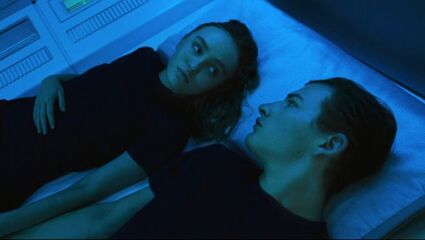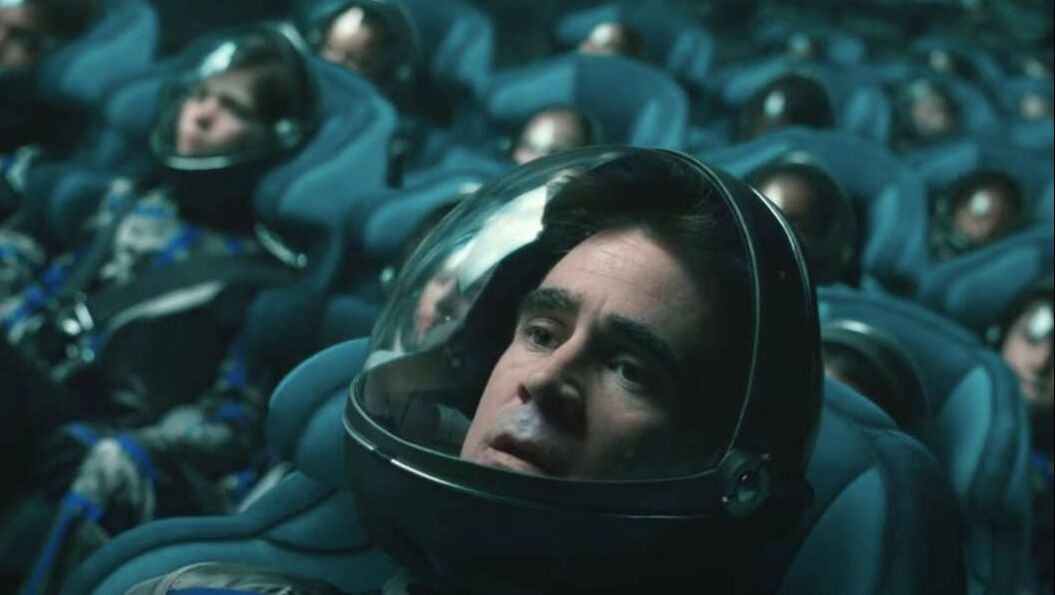 Isolation. Until the necessary restrictions that resulted from COVID-19, it was an unfamiliar feeling to most of us.... ...As naturally social beings, we long for the embrace of others and seek experiences in the outside world. But what if we were born never knowing these things make us inherently human? What if our basic instincts and desires were suppressed from the start? These are just some of the themes and questions posed in the 2021 film Voyagers. Written and directed by Neil Burger (The Illusionist, Divergent), this science fiction thriller centers on a multi-generational mission to find a new home for humanity in the year 2063. Earth has been plagued by disease, drought, and global warming to a cataclysmic extent. Richard (Colin Farrell), a scientist tasked with overseeing the plan to keep the human race alive, must protect the artificially grown humans made from the best specimens that humanity has to offer. These children will not know the outside world; instead, they are kept isolated and taught only one thing…the mission. This artificially crafted crew will then repeat the cycle of artificially creating children who will in turn create their children. The “third generation” will settle on and colonize the new planet. As we watch them grow during this process it becomes clear that Richard has become an almost father figure to the children. As such, he finds it difficult to abandon them to the cold, dark isolation of space. To suppress any unwanted issues on this space mission, and unbeknownst to everyone but Richard, they are given a supplemental drink called “Blue”. Anyone who has ever read or seen science fiction—especially dystopian sci-fi—knows that hardly anything is what it appears to be. “Blue,” as we later learn, is in fact a drug that suppresses all pleasure/desire and feeling. Think of it like the drug Prozium from Equilibrium or if you turned Vulcans into an energy drink. The film boasts an all-star cast of young actors such as Isaac Hempstead Wright (Game of Thrones), Viveik Kalra (Blinded by the Light) and Chanté Adams (Bad Hair) in supporting spots and Tye Sheridan (Ready Player One), Fionn Whitehead (Black Mirror: Bandersnatch) and Lily-Rose Depp (Yoga Hosers) as the main characters who embark on a thrill ride full of lust, jealousy, paranoia, and violence. Voyagers feels a bit like Burger was aiming to adapt Lord of the Flies in space. Similar themes and power dynamics are at play, particularly when it comes to pitting Christopher (Sheridan) against Zac (Whitehead). While the concept may sound like it might flounder, Voyagers’ excellent script, directing, and acting make this one of the best sci-fi films of 2021. A sense of isolation is everywhere in this film. Not only are they physically cut off from the rest of the world as they float through space, but there is also a feeling—thanks in part to Burger’s use of hallway imagery—of self-isolation. Even in moments where everyone is physically together, they feel distant and disconnected from one another, which of course results in the inevitable schism. A feeling of paranoid claustrophobia increases throughout the film. The long hallway imagery in particular begins to feel almost suffocating; no matter how far we run there is no end in sight. We as viewers are just as trapped as the people we’re watching onscreen. A director is nothing without their cinematographer, and who better to compliment Burger’s directing than cinematographer Enrique Chediak (127 Hours, 28 Weeks Later)? With smooth, long takes down corridors to near-claustrophobic spaces and tight close-ups or over-the-shoulder shots, Chediak has a way of using the lens to create some of the film’s most cinematic shots while making viewers feel even more boxed into this already constricted setting. Editor Naomi Geraghty’s skills are on full display when coupled with this impressive camerawork. The moments signifying “Blue” losing its potency on the passengers felt reminiscent of Darren Aronofksy’s Requiem for a Dream. The final piece of the film’s thematic puzzle is Trevor Gureckis’ (Hunters) impressive score. His composition has a cosmic feel to it, with little notes that give a sense of listening to the stars twinkle. As the action ramps up, the strings of his work flow faster and faster, aiding to build the tension. Overall, the soundscape he creates is a fantastic dread-filled sense of wonder and amazement. I could go on and on about what makes this film such a great science fiction thriller, even when its ultimate message of hope is sometimes drowned by a nihilistic sense of self-doubt. It never feels like it’s hitting you over the head, only gradually building as the film progresses. Voyagers is a unique spin on the classic survival-of-the-fittest tropes we’ve seen time and time again. What sets it apart is its idea that, while we are left feeling alone and closed off from the world, surrounded only by the stark white of endless hallways, there is, in fact, an end. Considering the difficult times we are still wading through out here in the real world, it offers a message I feel we so desperately need: motivation to look to the possibilities of the future waiting for us just in the distance. Voyagers comes to theaters from Lionsgate April 9th. By Kalani Landgraf Support the AAPI Community Fund with us by donating here.
0 Comments
Leave a Reply. |
Archives
March 2023
|


 RSS Feed
RSS Feed